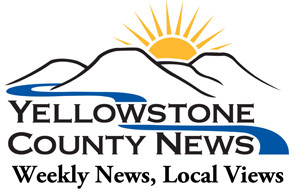A great deal of animosity was evident Thursday, November 21, from the Shepherd community at a public meeting regarding the idea of Pacific Steel & Recycling (PSR) building a repository to store scrap metal waste near the corner of U.S. Highway 87 North and Shepherd Acton Road.
PSR is planning to develop a roughly $2.5 million repository to support its Lockwood plant where cars, trucks and white goods are shredded and processed as scrap metal. The leftover material, called Auto Shredder Residue (ASR), is thought to contain minerals, rubber and plastics that will be valuable in the future, which is why the company wants to build a repository to store ASR for future use.
In October, Montana’s Department of Environmental Quality (DEQ) posted PSR’s application to build the repository, which DEQ considers a “landfill” for permitting purposes, for public comment. A group formed called “Stop the Shepherd Landfill” to resist the project based on their view that ASR waste contains “hazardous, cancer-causing particles.”
The group includes Kit Charter Nelson, whose family farms in the area; Anellise Deters, who lives two miles from the proposed site on Shepherd Road; and Tricia Mae, who has had experience as a project manager for a wood waste landfill, and lives on Yeoman Road over three miles from the site.
At last Thursday’s meeting, held at the Shepherd High School gym, DEQ Solid Waste Supervisor, Fred Collins, gave a brief overview of the permitting process. Any entity wishing to build a landfill must first fill out a 272-page license application which often includes hundreds more pages of attachments and indexes. They must also draft an Environmental Assessment (EA).
Next, DEQ publishes the draft EA and application for public comment. “We review any substantive comments,” said Collins. “So, any comments that are dealing with the topics of interest as far as the groundwater concerns, wildlife, things like that.” He said staff does not review “non-substantive” comments like, “We don’t want it,” because “it doesn’t give us anything to grab onto and review.”
ASR waste is classified as “solid waste,” not hazardous waste, by the DEQ. He said DEQ drew that conclusion based on analytical tests.
Collins’ talk was followed by a public Q&A session. The event hosts asked people to write their questions on notecards.
The first question related to traffic safety near the proposed site: “Will Hwy 87 have turn lanes on both sides?” A traffic impact study included in PSR’s application stated, “No infrastructure improvements are necessary to accommodate the additional traffic that the project will generate.” In other words, no added turn lanes or other new traffic control is necessary based on the “minimal” traffic the repository plans to create, according to the study.
However, according to one woman who called out from the audience, “If you live in this area, and you drive [Hwy] 87, you know that people are constantly passing you on either side. It’s the people who are not paying attention whatsoever – that’s why we need those turn lanes.”
Collins said he would request a second look at traffic safety by the Department of Transportation.
Another question was, “Why does Pacific Steel no longer want this ASR, and why don’t you just continue to take it to the Billings Landfill?”
PSR Health & Safety Director, Kirby Farner, answered that technology could be available soon – perhaps within a few years – which would allow PSR to recover recyclable material from ASR waste rather than just throwing it away in the landfill. A repository would allow the company to “have complete oversight of the process and immediate access to the material,” said Farner.
There were also several questions on garbage and air monitoring at the proposed repository, to which Farner said a company does not remain in business for 100+ years, as Pacific has, if it “does not follow the law.”
“We recently went eighty months in nine states in 46 facilities without a single environmental violation,” added Farner. “That’s over five years.” He invited people to look up PSR on a website called Enforcement and Compliance History Online (ECHO), part of the U.S. Environmental Protection Agency (EPA), for further details on the company’s record of complying with environmental laws.
In response, a woman in the audience stood up and began shouting that she had been on the ECHO website just a few hours earlier. She claimed Pacific Steel had ... Read more here.

